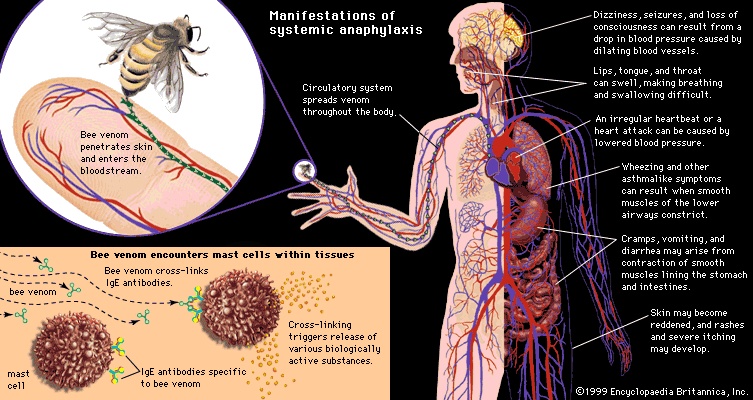anaphylaxis
physiology
also called anaphylactic shock
 in immunology, a severe, immediate, potentially fatal systemic allergic reaction to contact with a foreign substance, or antigen, to which an individual has become sensitized.
in immunology, a severe, immediate, potentially fatal systemic allergic reaction to contact with a foreign substance, or antigen, to which an individual has become sensitized.Anaphylaxis is a type I hypersensitivity reaction (immune system disorder). Asthma is another example of a type I reaction, but, whereas asthma is localized to the respiratory region of the body, anaphylaxis has effects throughout the organism. In all type I allergic reactions, sensitization occurs when a substance triggers the immune system to recognize it as a threat to the body. Upon subsequent exposure, an allergic reaction can occur. Almost any substance can induce anaphylaxis, but the most common agents are drugs such as penicillin, foods such as nuts and shellfish, and insect venom. Anaphylaxis may occur after contact with extremely small amounts of antigen and is more common in persons with a history of atopic dermatitis. In some cases anaphylaxis may be precipitated by exercise, and in other cases no cause is known.
Symptoms of anaphylaxis include an itching of the scalp and tongue, difficulty in breathing because of swelling or spasm of the bronchi, skin flush of the whole body, an abrupt fall in blood pressure, vomiting or abdominal cramping, and unconsciousness. In milder cases hives may spread over the whole body, and often there is a severe headache. Treatment, which must begin within a few minutes of attack, involves the injection of epinephrine (epinephrine and norepinephrine) (adrenaline), followed by the administration of antihistamines, corticosteroids, bronchodilators, and fluids.
The mechanism of anaphylaxis is mediated primarily by antibodies (antibody)—specifically those of the immunoglobulin E (IgE) class. These antibodies recognize the offending antigen and bind to it. The IgE antibodies also bind to specialized receptor molecules on mast cells (mast cell) and basophils (blood), causing these cells to release their stores of inflammatory chemicals such as histamine, serotonin, and leukotrienes, which have a number of effects, including constriction of the smooth muscles, which leads to breathing difficulty; dilation of blood vessels, causing skin flush and hives; and an increase in vascular permeability, resulting in swelling and a decrease in blood pressure.
- supplejack
- supplicatio
- supply and demand
- supply curve
- Suppé, Franz von
- suprasegmental
- Suprematism
- Supreme Court justices, U.S.
- Supreme Court of Japan
- Supreme Court of Judicature
- Supreme Court of the United States
- Supremes, the
- Sup'ung Dam
- Surabaya
- surah
- Surakarta
- suramin
- Sura River
- Surat
- Surat Thani
- surcoat
- Surduc Pass
- Surenas
- Surendranagar
- Suresnes